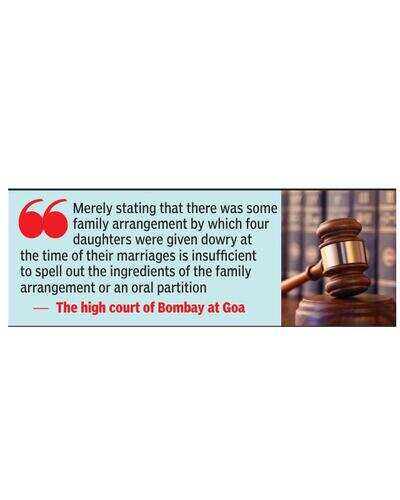Trending Topics
Woman, now 80, gets right in father’s property after 30 years
PANAJI: In a property dispute spanning three decades, the high court of Bombay at Goa ruled that a Margao woman — now 80 — had a right in the family property, which was “purported to be exclusively usurped by the brothers to exclude the sisters”. The high court quashed the transfer deed made by the family members in 1990 without the consent of the appellant.
“Merely because one of the sisters deposed in favour of the brothers does not mean that the issue of family arrangement or oral partition was duly proved,” Justice Mahesh Sonak observed in the judgment delivered on March 16. “There is no evidence about providing a sufficient dowry to the daughters of the house. However, even if it is assumed that some dowry was provided to the daughters, that does not mean that the daughters cease to have any right in the family property.”
The high court added, “The rights of the daughters could not have been extinguished in the manner in which they have been attempted to be extinguished by the brothers, post the father’s demise.”
In this case, the appellant in 1994 instituted a special civil suit to declare the transfer deed dated September 8, 1990, null and void and sought a mandatory injunction for its cancellation. The appellant also prayed for a permanent injunction to restrain the defendants from transferring or conveying the suit property based on the transfer deed without the appellant’s and other co-owners’ written consent.
The brothers submitted to the court that their four sisters were given sufficient dowry when they married. The brothers said that their father and they had a partnership and a shop and the property beneath the shop were covered by this partnership. They contended that neither the appellant nor her three sisters had any right, title, or interest in the shop.
Cleofato Almeida Coutinho, the counsel for the appellant, submitted that upon the death of her father, his estate was not inventoried nor partitioned through inventory proceedings or a deed of partition. Coutinho said that the consent decree, upon which the impugned transfer deed was purported to be based, was made in a suit to which the appellant was never a party.
“Accordingly, neither the consent decree nor the transfer deed made in pursuance of the same could bind the appellant, given the provisions of Section 35 of the Specific Relief Act,” Coutinho said. “The two courts did not adequately appreciate this crucial aspect.”
The court said, “In so far as the plea of oral partition is concerned, firstly, there is no evidence whatsoever to sustain such a plea.” The court went on to say, “Merely stating that there was some family arrangement by which four daughters were given dowry at the time of their marriages is insufficient to spell out the ingredients of the family arrangement or an oral partition.”
The court further observed, “Secondly, in terms of Article 2184 of the Code, a partition which is merely severance of a joint status cannot be effected orally and has necessarily to be by a written document.” The article cited is from the Portuguese Civil Code.
The court also noted, “It is clear that the provisions of Article 1565 of the Code are still in force. Therefore, in terms of the said article, the mother was not entitled to transfer her share in the suit shop to her two sons without the consent of the other sons and daughters.”
Article 1565 of the code provides that the parents or grandparents shall not be entitled to sell or mortgage to children or grandchildren if the other children or grandchildren do not consent to the sale or mortgage.
“Merely because one of the sisters deposed in favour of the brothers does not mean that the issue of family arrangement or oral partition was duly proved,” Justice Mahesh Sonak observed in the judgment delivered on March 16. “There is no evidence about providing a sufficient dowry to the daughters of the house. However, even if it is assumed that some dowry was provided to the daughters, that does not mean that the daughters cease to have any right in the family property.”
The high court added, “The rights of the daughters could not have been extinguished in the manner in which they have been attempted to be extinguished by the brothers, post the father’s demise.”
In this case, the appellant in 1994 instituted a special civil suit to declare the transfer deed dated September 8, 1990, null and void and sought a mandatory injunction for its cancellation. The appellant also prayed for a permanent injunction to restrain the defendants from transferring or conveying the suit property based on the transfer deed without the appellant’s and other co-owners’ written consent.
The brothers submitted to the court that their four sisters were given sufficient dowry when they married. The brothers said that their father and they had a partnership and a shop and the property beneath the shop were covered by this partnership. They contended that neither the appellant nor her three sisters had any right, title, or interest in the shop.
Cleofato Almeida Coutinho, the counsel for the appellant, submitted that upon the death of her father, his estate was not inventoried nor partitioned through inventory proceedings or a deed of partition. Coutinho said that the consent decree, upon which the impugned transfer deed was purported to be based, was made in a suit to which the appellant was never a party.
“Accordingly, neither the consent decree nor the transfer deed made in pursuance of the same could bind the appellant, given the provisions of Section 35 of the Specific Relief Act,” Coutinho said. “The two courts did not adequately appreciate this crucial aspect.”
The court said, “In so far as the plea of oral partition is concerned, firstly, there is no evidence whatsoever to sustain such a plea.” The court went on to say, “Merely stating that there was some family arrangement by which four daughters were given dowry at the time of their marriages is insufficient to spell out the ingredients of the family arrangement or an oral partition.”
The court further observed, “Secondly, in terms of Article 2184 of the Code, a partition which is merely severance of a joint status cannot be effected orally and has necessarily to be by a written document.” The article cited is from the Portuguese Civil Code.
The court also noted, “It is clear that the provisions of Article 1565 of the Code are still in force. Therefore, in terms of the said article, the mother was not entitled to transfer her share in the suit shop to her two sons without the consent of the other sons and daughters.”
Article 1565 of the code provides that the parents or grandparents shall not be entitled to sell or mortgage to children or grandchildren if the other children or grandchildren do not consent to the sale or mortgage.
Start a Conversation
FOLLOW US ON SOCIAL MEDIA
FacebookTwitterInstagramKOO APPYOUTUBE











